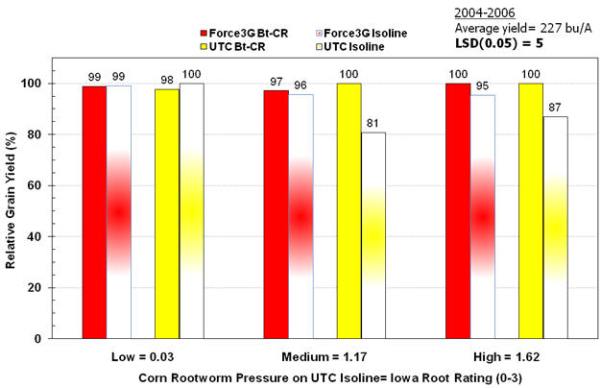
December 2007
Field Crops 28.44-53
Using the Bt-CR Transgene on the Farm
Joe Lauer and Eileen Cullen, Corn Agronomist and Entomologist
PDF Version
Corn rootworm is the most serious insect pest complex in the major corn producing
regions of the north central U.S. and Canada. Crop rotation with soybean is estimated
to be used on 80% of the north central U.S. acreage and is the most common pest
management practice for corn rootworm control. This control strategy can no longer
be used reliably on many acres of southeastern Wisconsin without beetle scouting
date from the previous year.
A variant of Western corn rootworm (Diabrotica virgifera virgifera LeConte)
lays eggs in soybean fields. Eggs are ready to hatch next year when planted to corn.
Variant western corn rootworm damage to first year corn was first observed in Illinois
after soybean during 1993 and wheat in 2002. A variant of Northern corn rootworm
(Diabrotica barberi Smith and Lawrence biotype) first observed in Minnesota
exhibits extended diapause where eggs remain in the soil an extra year and hatching
is delayed until corn is planted again.
Recently corn hybrids with Bt-CR (Mon863) transgenes have become available to farmers.
A three-year study tested Bt-CR hybrids and their normal isolines with and without
use of corn rootworm insecticides (Figure 1). As corn rootworm damage in the normal
isoline increased, using either Bt-CR hybrids or insecticide was important. At the
highest corn rootworm pressure, Bt-CR hybrids performed best when insecticide was
also applied.
Controlling corn rootworm can be achieved through numerous methods. Early reports
indicate that transgenic hybrids provide equivalent control to chemical
methods. Numerous products are labeled for chemical control. No hybrids
are resistant, but some tolerant hybrids have the ability to outgrow rootworm
damage and regenerate roots better than other hybrids. Crop rotation has
been a proven method of control but is beginning to break down in some areas. Good
weed control is needed to prevent corn rootworm adult attraction to weed flowers.
Some management practices will aid control such as planting late to starve
larvae, but may not be practical due to yield penalty. Some natural control
can be achieved through ground beetles and predaceous mites that feed on corn rootworm
eggs, larvae and pupae
Performance of Bt-CR hybrids indicate similar control to chemical methods. Bt-CR
hybrids reduces reliance on insecticide applications and have consistent performance
under variable field conditions. Bt-CR have an excellent safety profile especially
for human health and non-target organisms. Laboratory and field studies demonstrate
high level of control. One generation of selection occurs per year. Bt-CR hybrids
are not active against adult rootworm or other root / seed feeding insects. No acute
toxicity to adult corn rootworm is observed.

Figure 1. Relative grain yield response of Bt-CR (Mon863) transgenic corn hybrids
compared to their isolines with and without insecticide when grown in environments
varying for corn rootworm damage to the untreated isoline.